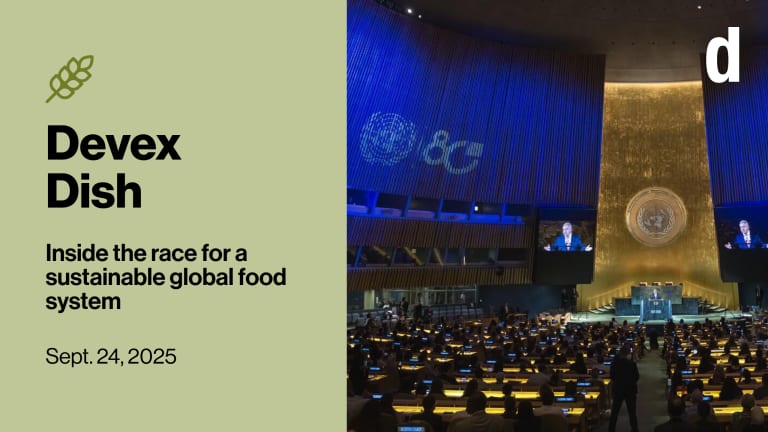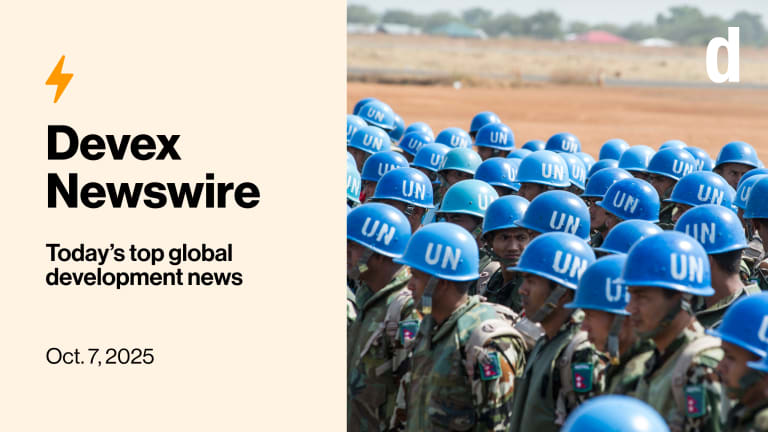Devex Newswire: How Trump and Russia could tank the UN’s finance ambitions
Presented by Pivotal

The United Nations wants a greater say in the global financial order. That may not go down well with Donald Trump or Russia.
Also in today’s edition: The Asian Infrastructure Investment Bank’s chief talks about how to bake cake (sort of), and American Airlines flight 5388 delivers a who’s who of food systems to Iowa.
The disruptors
This is a preview of Newswire
Sign up to this newsletter for an inside look at the biggest stories in global development, in your inbox daily.
For over a week, we’ve been keeping you posted on what everyone at the all-important World Bank-International Monetary Fund annual meetings have been talking about: Reforming the global financial architecture to better reflect today’s challenges — and address the gross power imbalance between the global north and south.
But the U.N. is getting in on the act — that is, if the U.S. and Russia don’t stand in the way.
The U.N. Pact for the Future, agreed to after plenty of hand-wringing and arm-twisting at the U.N. General Assembly in September, proposes revamping the international financial system, among other things. While the body has historically played a bit role in international finance, as the world’s most representative organization, with 193 member states — many of them without a voice at the World Bank and IMF — the U.N. has been pressing for a broader say in decision-making, my colleague Colum Lynch writes.
“The system was conceived by a group of rich countries and naturally it basically benefits rich countries,” António Guterres, the U.N.’s secretary-general, has said.
But those countries are loath to give up those perks. What’s more, if Donald Trump is elected to a second term in the White House, the situation could become even more chaotic.
“Are people concerned? Of course they’re concerned,” says Bob Rae, Canada’s U.N. ambassador and this year’s president of the U.N. Economic and Social Council. “I mean, I would sound like a bit of an idiot if I said nobody’s talking about it.”
But in the end, Rae says, “the American public will make up their own mind as to what they are going to do. So what we think is not really relevant to the outcome.”
Russia — which vehemently opposed the Pact for the Future — isn’t helping matters, though Rae has a reality check for Moscow.
Russia, he says, is just a “disruptor.”
“They are not even a significant lender,” he says. “They’re not a major economic power. They are just interested in being disruptive. And that is the Russian contribution to the world order.”
Read: US election puts UN community on edge (Pro)
+ Only one week to go before the U.S. election — the results of which could be seismic for global development. On Nov. 12, join us and a roundtable of experts to discuss the election outcome and its implications. Save your spot now.
This event is exclusive to Devex Pro members. Not a Pro member yet? Start your 15-day free trial today.
Is it cake?
Speaking of a new financial order, the traditional multilateral development banks are no longer the only game in town.
The Asian Infrastructure Investment Bank was considered an upstart when it launched in 2016. Today, it has 110 members, boasts a healthy capitalization of $100 billion, and has become a force to be reckoned with on the global lending stage.
But since its beginnings, it’s also been dogged by accusations that China is the invisible hand guiding the bank. It’s why the U.S. and Japan, which hold top roles at the Asian Development Bank, are not among AIIB’s 110 members.
But Jin Liqun — AIIB’s founding president, a former vice minister at China’s Ministry of Finance, ranking vice president at ADB, and alternate executive director for China at the World Bank — is nonplussed, insisting everything is relatively fine.
“We did not invite the United States, Japan, or European countries to join the bank,” Jin told Devex World in Washington, D.C., Thursday. “We invited the United States, Japan, European countries to join in the making of the bank — making rules together. To draw an analogy: I invited the United States to come to the kitchen: ‘Let’s make the cake together.’”
“A multilateral development bank should remain apolitical,” he added. “But for the management members to keep this bank apolitical, you have to be politically sensitive, which means we need to work with all of the members and all those nonmembers, to ensure that anything we do would protect this bank in the best interest of all of the members.”
Read: AIIB boss says bank is ‘politically sensitive’ but ‘apolitical’ (Pro)
ICYMI: Asian Infrastructure Investment Bank wants to go beyond infrastructure
+ Don't miss our upcoming post-Devex World 2024 newsletter, arriving in your inbox tomorrow. We'll share key takeaways, give the highlights, and provide exclusive insights from the event.
All aboard the Borlaug express
American Airlines flight 5388 from Washington, D.C., to Des Moines, Iowa, on Monday wasn’t officially a chartered plane to the World Food Prize Foundation’s Borlaug Dialogue conference, but it may as well have been.
The passenger manifest was a who’s who of food systems experts en route to the home state of Norman Borlaug, the famed agronomist and father of the Green Revolution, for three days of talks on ending hunger; trends and innovations in food and agriculture; combating climate change; preserving crop diversity; and much more.
On the plane, Devex Senior Editor Tania Karas spotted World Bank President Ajay Banga; Millennium Challenge Corporation CEO Alice Albright; former Bread for the World President David Beckmann; Margaret Zeigler, the U.S. representative for the Inter-American Institute for Cooperation on Agriculture; Anna Nelson, the U.S. deputy special envoy for global food security; Tufts University food and nutrition professor Eileen Kennedy; Dan Silverstein, a consultant on private sector and capital markets for agricultural and economic development; and many others.
The Borlaug Dialogue’s star-studded speaker list also features African Development Bank President Akinwumi Adesina; Sierra Leone President Julius Maada Bio; Madagascar President Andry Rajoelina; Tanzania President Samia Suluhu Hassan; several agriculture ministers; and the heads of numerous global food systems and nutrition agencies and organizations.
The World Food Prize is often called the Nobel Prize of food and agriculture. This year’s award is going to Cary Fowler and Geoffrey Hawtin, who each played a major role in creating the Svalbard Global Seed Vault — or “doomsday” vault — an arctic facility in Norway that safeguards the world’s seed varieties to protect global food security. They will be honored at a ceremony in Des Moines on Thursday evening.
Background reading: Scientists behind arctic ‘doomsday’ seed vault win World Food Prize
+ Are you at the Borlaug Dialogues too? Reach out to Tania at tania.karas@devex.com, or just stop and say hello.
Budget battles
Anyone hoping the U.K.’s aid budget will receive a bailout in a crucial financial statement on Wednesday is almost certain to be disappointed — but will that mean aid is being cut?
All signals are that a loud campaign for a top-up — to avoid spending on overseas programs falling to a 17-year low, according to Bond, the representative body for the country's NGOs — has fallen on deaf ears, as the government rescues struggling domestic services. However, nothing is straightforward in U.K. aid spending, as my colleague Rob Merrick has been diligently chronicling.
Bond’s focus is on the (shrinking) share of official development assistance spent overseas, excluding the billions diverted to meet the costs of hosting asylum seekers.
This rose sharply late last year, when the Foreign, Commonwealth & Development Office received a mysterious £1.5 billion ($1.95 billion) ODA increase, attributed to less spent on refugees (even though it later emerged more was spent) and to a growing economy (even though the 0.5% of gross national income spending target was already being exceeded). It was all very murky.
Rob has been told ministers are desperate to avoid the devastating “aid falls to 17-year low” headline, so a later increase to FCDO ODA spending cannot be ruled out, even if no overall aid budget top-up is announced on Wednesday.
In other news
Israel's Parliament passed bills that ban the U.N. agency for Palestinian refugees from operating within its borders. [The New York Times]
Egypt is assessing the impact of recent economic reforms on its vulnerable population ahead of IMF talks next month. [Bloomberg]
The U.N. weather agency warned that greenhouse gasses have reached record highs in 2023, urging major polluters to act on climate change before next month's COP29. [UN News]
Sign up to Newswire for an inside look at the biggest stories in global development.
Search for articles
Most Read
- 1
- 2
- 3
- 4
- 5








